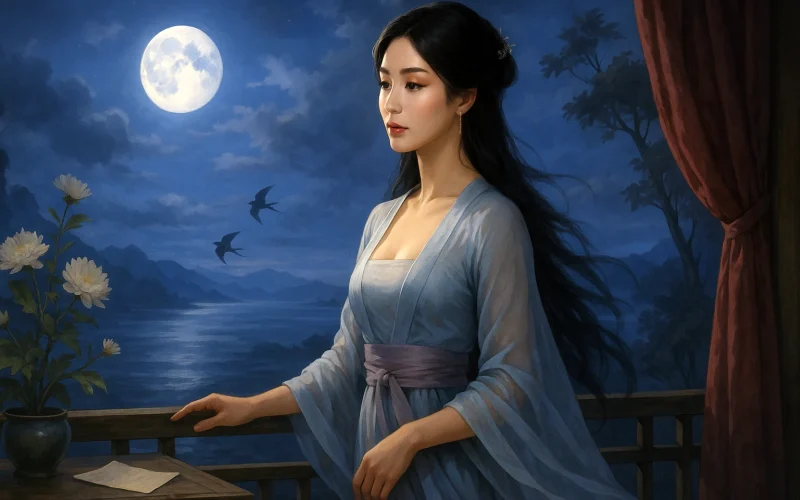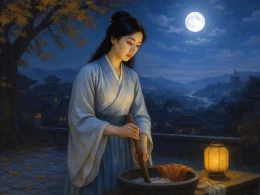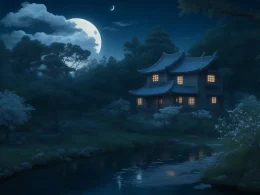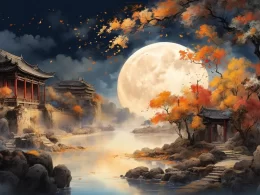Time knows only to hasten age on;
It cares not for love, nor grieves o’er the parting song.
Tears stain spring robes, wine sobers soon.
Last night the wutong trees stood in the gale;
The pale moon shed her indistinct light.
Sweet dreams are broken without fail.
Whence comes the wild goose’s cry from the height?
Original Poem
「采桑子 · 时光只解催人老」
时光只解催人老,不信多情,
长恨离亭,泪滴春衫酒易醒。梧桐昨夜西风急,淡月胧明,
晏殊
好梦频惊,何处高楼雁一声?
Interpretation
This lyric was likely composed during a period of career transitions and personal partings in Yan Shu's life. The poem conveys profound, lingering emotions, using the sorrow of separation to reflect on life's impermanence. The poet, perhaps having long awaited news in vain, pours his melancholy onto the page—blending personal grief, resignation to love's fragility, and lament for life's fleeting nature into this exquisitely nuanced lyrical masterpiece.
First Stanza: "时光只解催人老,不信多情,长恨离亭,泪滴春衫酒易醒。"
Shí guāng zhǐ jiě cuī rén lǎo, bù xìn duō qíng, cháng hèn lí tíng, lèi dī chūn shān jiǔ yì xǐng.
Time knows only to hasten our decay, / Indifferent to lovesick souls. At the farewell pavilion, / Enduring sorrow took root—tears stain spring robes, / While wine's solace proves fleeting.
The opening line establishes the poem's existential theme with "Time's relentless march," mourning life's brevity and love's fragility. The "farewell pavilion" crystallizes the source of grief, while "tear-stained robes" and "short-lived drunkenness" materialize emotional pain. Within four concise lines, the emotional arc surges—from philosophical musing to visceral anguish—showcasing Yan Shu's signature blend of compression and lyrical restraint.
Second Stanza: "梧桐昨夜西风急,淡月胧明,好梦频惊,何处高楼雁一声?"
Wú tóng zuó yè xī fēng jí, dàn yuè lóng míng, hǎo mèng pín jīng, hé chù gāo lóu yàn yì shēng?
Last night's fierce west wind lashed the parasol trees; / Through hazy moonlight, pale and dim, / Sweet dreams broke again and again— / Then, from some far-off tower, a solitary wild goose's cry.
Here the focus shifts outward: parasol trees, bitter wind, and veiled moonlight paint an autumnal nocturne. "Shattered dreams" mirror inner turmoil, while the "solitary goose's cry" pierces the scene—a masterstroke embodying both yearning and the ache of unanswered letters. The awakening to this sound deepens the solitude, leaving an echo of infinite longing.
Holistic Appreciation
This is a poignant lyric poem of parting sorrow, woven with graceful and tender strokes to depict a lover's lament over the passage of time and lingering attachment to past affections. The first stanza brims with emotion, using the interplay of time and space to underscore the weight of love; the second stanza mirrors feelings through scenery—autumn night's wutong trees, west wind, pale moon, and lone wild geese, all laden with symbolism—layering the sorrow of separation. The poem intertwines the bitterness of reality with the illusion of dreams, portraying an inescapable emotional dilemma. With elegant and natural language, Yan Shu interweaves the pain of "deep affection" with life's brevity, creating profound sentiment and enduring resonance.
Artistic Merits
The poem is ingeniously conceived, blending emotion into scenery in both stanzas without rigidly adhering to the "scene above, feeling below" structure. Linguistically, it inherits Yan Shu’s warm and delicate style—phrases like "tears staining spring robes," "hazy pale moonlight," and "a lone goose’s cry" are masterful examples of emotion infused into scenery and vice versa. The imagery, centered on "wutong trees," "west wind," and "solitary wild geese," carries deep metaphorical meaning, evoking a chill, melancholic atmosphere. Emotion unfolds in winding, subtle layers, rendering the lament of the tender-hearted progressively intense and moving.
Insights
Through its portrayal of life’s fleetingness and the sorrow of separation, the poem speaks to the fragility and preciousness of human emotions. In time’s relentless flow, steadfast affection is often torn apart by reality, and parting becomes love’s deepest scar. Though the poet writes of helplessness and grief, lines like "good dreams startled awake" and "a goose’s lone cry" also hint at a faint hope for reunion. This poem reminds us to cherish those before us, to understand the weight of deep feeling, and to find warmth in human connection even amidst desolate scenes.
Poem Translator
Xu Yuanchong (许渊冲)
About the Poet
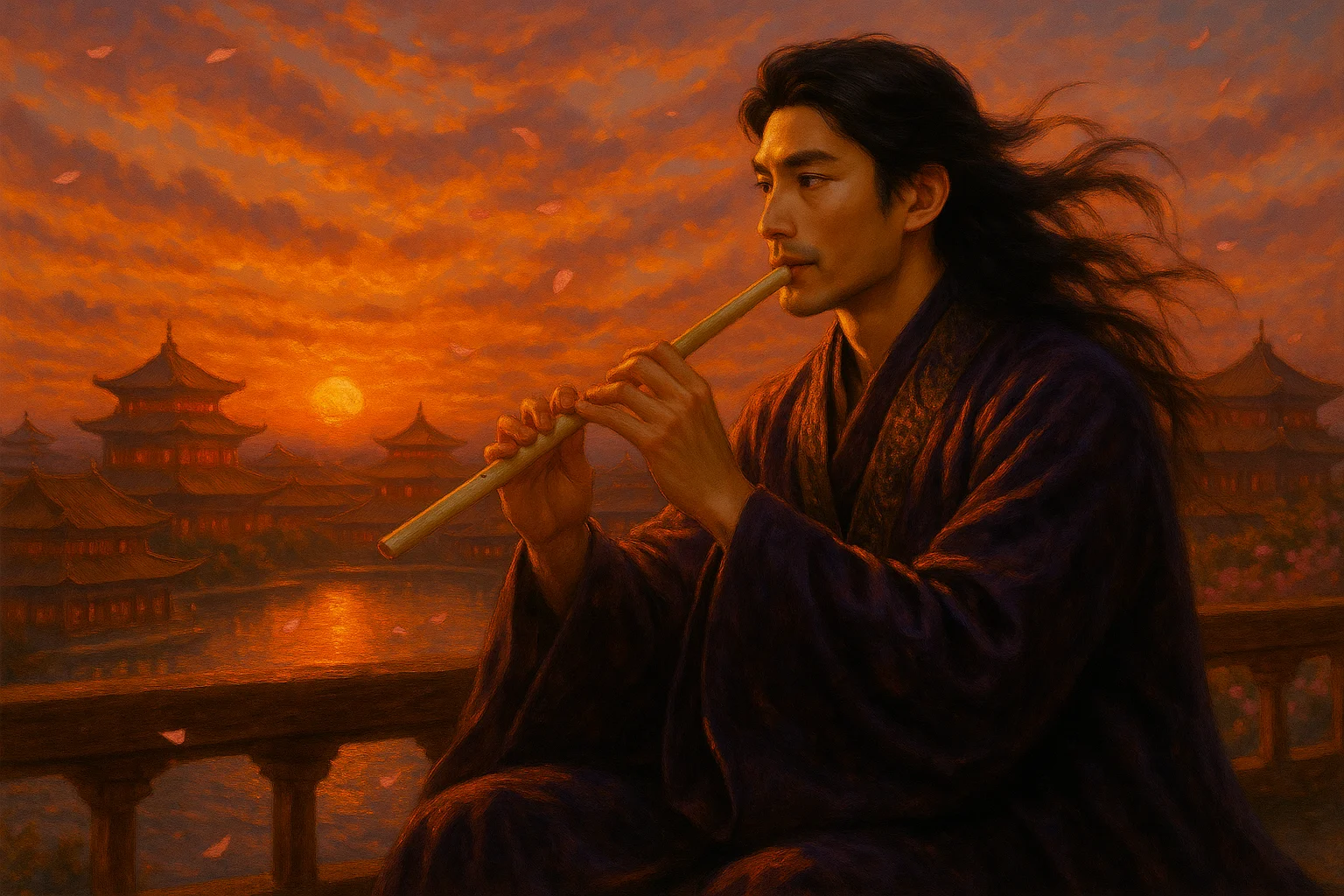
Yan Shu (晏殊 991 – 1055) Originaire de Fuzhou dans le Jiangxi, Yan Shu fut le maître fondateur de l'école wanyue (élégante et retenue) de la poésie ci sous les Song du Nord. Enfant prodige entré dans l'administration à quatorze ans, ses ci allient noblesse classique et méditation philosophique dissimulée sous des évocations de prospérité raffinée. Mentor de talents comme Fan Zhongyan et Ouyang Xiu, il initia l'École du Jiangxi en poésie ci et posa les bases de l'épuration du genre sous les Song.







